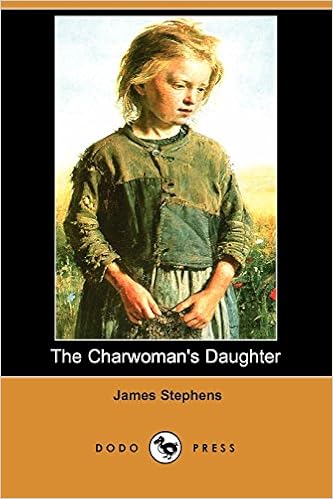Sometimes, my lists just throw the strangest books in my lap. Mostly, if I'm pulling from one of the many editions of 1001 Books to Read Before You Die, I get why they're on the list, whether or not I like them. (I'm around 20% done with that one.) This book, though, I am a little baffled by. It's not very long, and it feels like there's not a lot too it. As a look at poverty, it's no Ragged Trousered Philanthropists. As a slice of life in Dublin, it's no Ulysses. As a novel about the plight of women, it's...well, it's just a bit strange.
It does not help that the main character is named Mary Makebelieve.
I just did some research on the author, and it sounds like James Stephens is best known for retellings of Irish myths and legends, and frankly, I would far rather have read one of those. Unless this is supposed to also be one, but I'm not sure which myth or legend it would be. He also claimed to share a birthday with James Joyce, who was a friend of his, but he was likely wrong. In the end, I didn't mind reading this, but I didn't get it.
Mary is a sixteen year old girl. She does not seem overly prone to fabulizing, despite her name. She is not particularly educated, nor does she work. Her mother, as the title of the book indicates, is a charwoman, but frequently gets fired from her housecleaning jobs because she does not like employers who look down on her. She makes enough so that Mary doesn't have to work. While she is at work, Mary wanders the streets of Dublin, in a fairly innocent way.
That's pretty much her whole life - evenings with her mother, days looking in shop windows and at people as she promenades.
The first thing that changes is that she notices a burly policeman, which leads her to a fairly disturbing moment where she asks her mother if it is nice to be hit by a man. Which...kind of makes her a little dull - her mother is profoundly upset by the question, and I'm not sure what in Mary's life was supposed to give her the impression domestic violence was awesome.
She's innocent of sex, pretty much, but it doesn't seem due to religion, but more that her mother wants to keep her a little girl. She meets the policeman a few times in the park, but nothing much happens other than that he talks and she listens. He gets a bit more aggressive when she has to fill in for her mother cleaning and he sees her class, but that causes her to pull away, causing him to propose.
But that scene isn't that stressful either - Mary's mother leaves it up to her, she says she doesn't want to marry him, that's about it. The policeman does go and beat up the other young man he's seen her with, but that's about the end of it. Mary seems like she'll end up with the other young man, and that seems like it would be okay.
I have been saying "seems" a whole lot, and that's because we don't get much inside these characters, nor is the action particularly compelling. I'd guess it's supposed to be a slice of life in Dublin, but it's a pretty mundane one. And the writing isn't enough to propel me through - there's no engrossing prose to make this daily life mean something more.
In the end, I don't get it. I just don't.

As a Dubliner, I never really got this book either even though it was on the secondary school syllabus when I was a student in the late '70s.
ReplyDeleteI guess it was a book for its time, just titillating enough not to be banned in the holy Catholic Ireland of 1910.
By the way Stephens was a good friend of Joyce in the '30s and as the latter's health began to deteriorate, he actually asked Stephens to finish Finnegan's wake should he die before finishing it.